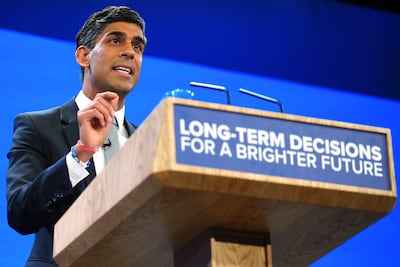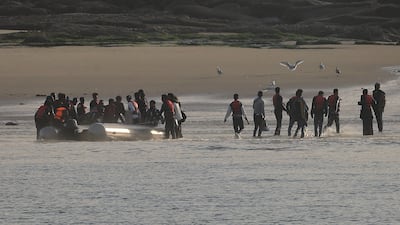The UK government’s plan to deport migrants to Rwanda is being challenged by asylum seekers from Syria, Iran and Iraq.
Supreme Court judges will today begin hearing the government's appeal against a ruling earlier this year that the plan is unlawful.
In a bid to cut the number of migrants crossing the English Channel in small boats, the UK hopes to deport those who arrive by irregular means to the East African country.
The issue is an important one for Conservative Prime Minister Rishi Sunak whose promise to “stop the boats” was one of five pre-election pledges he announced in January.
The Court of Appeal ruled in June that Rwanda could not be considered a safe country, after a challenge to the policy by 10 migrants and a charity supporting refugees.
But the start of the three-day hearing, Sir James Eadie KC, for the Home Office, said the policy to remove people to "a country less attractive" than the UK, "but nevertheless safe", was legal.
Both countries are "committed" to the deal, with "very powerful" practical incentives for Rwanda to comply with the assurances given, he told the court.
Mr Eadie said there was "a serious and pressing need to take effective steps that will act as a deterrent to those undertaking the perilous and sometimes life-threatening journey, typically across the Channel, from a safe country".
The unnamed migrants include an asylum seeker who said he fled Syria in September 2021 to avoid being forced to join the YPG, a Kurdish group controlling a north-eastern part of the country.
He said his journey across Europe, which saw him pass through Turkey, spend three days in the back of a lorry and stay for around seven months in a “jungle” in Dunkirk. He then crossed to the UK on an inflatable boat.
He did not claim asylum in France because he was “scared” YPG supporters would find and kill him.
Another Syrian asylum seeker who said he fled the war and military conscription in mid-2018 allegedly experienced “negligence, mistreatment and violence” by Greek authorities and “detention, beatings and humiliation” by Turkish authorities.
He also said he was victim to “control by violent people smugglers” and has been separated from his family since fleeing Syria.
His lawyers said he has suffered “significant trauma from his experiences of the war in Syria and has expressed suicidal thoughts”.
Among the group challenging the UK government is an asylum seeker from Iran whose lawyers said he has a “history of political activism” and engaged in protests in the country.

He said he fled political persecution there last year, with his mother arranging for people smugglers to take him “somewhere safe”.
His journey to the UK saw him spend more than seven days in lorries and travelling in an inflatable boat.
An Iraqi asylum seeker claimed to have spent days travelling by bus, lorries, a cargo train and van to Dunkirk in France, with him later crossing the Channel on a small boat.
His lawyers said he “cannot read or write”, is a “victim of torture” and has been diagnosed with post-traumatic stress disorder.
The other asylum seekers challenging the government, with backing from charity Asylum Aid, are from Vietnam, Sudan and Albania.
Raza Husain KC, for several of the asylum seekers in the case, described Rwanda at a previous hearing as "a highly autocratic repressive state" which "imprisons, tortures and murders those it considers to be its opponents".
The UN's High Commissioner for Refugees, which has intervened in the legal challenges over the policy, previously said Rwanda "lacks irreducible minimum components of an accessible, reliable, fair and efficient asylum system".
In the agency's written submissions to the Supreme Court, Angus McCullough KC said it had "consistently expressed grave concerns" about the safety and legality of the policy.
"UNHCR maintains its unequivocal warning against the transfer of asylum seekers to Rwanda under the UK-Rwanda Arrangement," he added.
Human rights groups and charities protested the deportation plan, and the first removal flights were successfully blocked by legal action.
About 24,000 migrants have made the crossing so far this year with arrivals spiking during the summer months when sea conditions are calmer.
More than 100,000 migrants have crossed the Channel in small boats from France to south-east England since Britain began publicly recording the arrivals in 2018.


